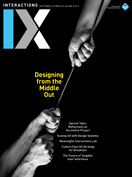Authors:
Elena Not, Daniela Petrelli
Thirty years ago, content in museums and cultural heritage sites consisted mostly of labels, explanation panels, written leaflets, and books. The aim was to help visitors make sense of exhibits and places, understand the history behind their creation and usage, and appreciate their aesthetic values. Guidelines for effective label design followed from museum and audience studies, such as these from Beverly Serrell [1]: Insights Labels should begin with concrete, visual references to the objects they interpret to bring them to life. Labels should relate to the big idea of the exhibit, not ramble without focus or objectives, or…
You must be a member of SIGCHI, a subscriber to ACM's Digital Library, or an interactions subscriber to read the full text of this article.
GET ACCESS
Join ACM SIGCHIIn addition to all of the professional benefits of being a SIGCHI member, members get full access to interactions online content and receive the print version of the magazine bimonthly.
Subscribe to the ACM Digital Library
Get access to all interactions content online and the entire archive of ACM publications dating back to 1954. (Please check with your institution to see if it already has a subscription.)
Subscribe to interactions
Get full access to interactions online content and receive the print version of the magazine bimonthly.






